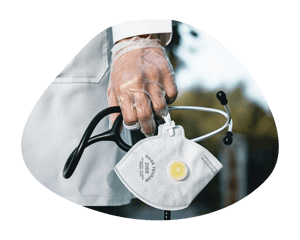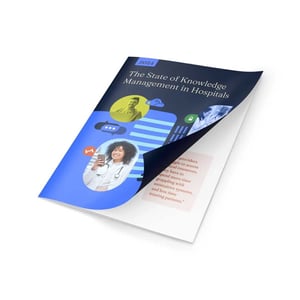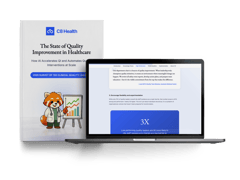Prevent Nurse Burnout and Improve Staff Retention with C8 Health
C8 Health helps nurses streamline workflows by providing instant access to critical knowledge and reducing administrative burden, helping hospitals prevent burnout and retain their nursing staff.
What is nurse burnout?
Nurse burnout is an occupational phenomenon caused by chronic workplace stress. It leads to emotional exhaustion, depersonalization, and reduced job performance, ultimately leading to turnover. Recent research places the cost of nurse turnover at the average U.S. hospital at $3.9M — $5.8M annually. Some key causes of burnout include:burden Nurses spend excessive time navigating outdated IT systems rather than providing direct patient care.
workflows
Repetitive documentation and procedural inefficiencies contribute to increased stress and time constraints.
The Hidden Danger of Nurse Burnout
of medical organizations
have reported having a nurse retire early or leave due to burnout.*
C8 Health was developed to tackle the root problem by reducing administrative burden and supporting nurse wellness.
The cost of high nurse turnover
High nurse turnover is one of the most pressing challenges in healthcare today. With an 18% national turnover rate, hospitals struggle to maintain adequate staffing levels, leading to increased costs and operational strain. When experienced nurses leave, the remaining staff face heavier workloads, accelerating burnout and further turnover.
The cycle continues, impacting patient care, staff morale, and hospital efficiency. Addressing burnout is critical to improving retention and creating a sustainable nursing workforce. When nurses leave, hospitals face:
- Soaring replacement costs – it takes $40,000-$64,000 to replace a single nurse.
- Increased workload for remaining staff, accelerating further burnout.
- Disruptions to patient care and hospital efficiency due to staffing shortages.

How to prevent nurse burnout
Healthcare organizations can prevent nurse burnout by addressing the systemic and organizational factors that contribute to it:
- Reduce administrative burdens: Automate documentation and workflows to free up time for patient care, lowering documentation time and cognitive load to improve job satisfaction.
- Enhance support and autonomy: Give nurses more control over schedules and patient care, offer mental health resources, peer support, and regular wellness workshops to boost engagement.
- Promote interdisciplinary collaboration: Foster teamwork among nursing teams to reduce isolation, distribute workloads more effectively, and ensure nurses feel supported in delivering patient care.
While all aspects of burnout must be addressed, 46% of health workers believe reducing administrative tasks would be the most effective way of alleviating burnout.

C8 Health: Healthcare knowledge management to prevent physician burnout
Provides nurses with a single, accurate knowledge base, reducing information overload and minimizing time spent searching for resources.
workspaces
Supports team collaboration and peer engagement with site-specific workspaces, comments, and discussion boards to share insights and solutions.
Simplify search with C8 Panda AI’s natural language querying and filters. Delivers relevant, just-in-time knowledge and reduces manual tasks, allowing nurses to focus on patient care.
Features for nursing staff
By automating manual workflows — such as content creation, revision, and dissemination — C8 Health reduces nurses’ administrative burden. This approach enables them to spend more time on patient care rather than on non-clinical tasks.
C8 Health prevents nurse burnout and its consequences

By automating documentation, protocol updates, and knowledge dissemination, C8 Health cuts down on non-clinical tasks, allowing more focus on patient care. This reduction in administrative load directly supports nurse efficiency and satisfaction.
By automating documentation, protocol updates, and knowledge dissemination, C8 Health cuts down on non-clinical tasks, allowing more focus on patient care. This reduction in administrative load directly supports nurse efficiency and satisfaction.

Centralized, easily accessible clinical knowledge means nurses spend less time searching for information, which decreases cognitive load and supports confident, evidence-based decision-making.
Centralized, easily accessible clinical knowledge means nurses spend less time searching for information, which decreases cognitive load and supports confident, evidence-based decision-making.

Real-time updates on clinical protocols and guidelines help nurses stay current, reduce errors, and ensure better patient outcomes. Nurses also report greater adherence to best practices when these updates are integrated into their workflows.
Real-time updates on clinical protocols and guidelines help nurses stay current, reduce errors, and ensure better patient outcomes. Nurses also report greater adherence to best practices when these updates are integrated into their workflows.

C8's AI-driven assistant and streamlined workflows reduce daily struggles to access knowledge, minimizing the risk of emotional exhaustion, a core element of burnout.
C8's AI-driven assistant and streamlined workflows reduce daily struggles to access knowledge, minimizing the risk of emotional exhaustion, a core element of burnout.
Beat burnout with C8 Health
- 88% of C8 users report that C8 Health saves them time in daily clinical practice by reducing administrative tasks and centralizing information.
- C8 Health achieves a 90% adoption rate within six months, with clinicians viewing an average of 6.6 items and engaging in three sessions per day.
- In a department of 100 clinicians, C8 Health estimated an annual time savings of 8,400 hours and cost savings of approximately $1.6 million.


Is C8 Health right for your organization?
If nurses spend substantial time on non-clinical duties like documentation or protocol updates, an automated platform could reduce this load, allowing them to focus more on patient care.
If nurses face delays or challenges accessing critical information, a centralized, real-time platform can improve efficiency and reduce cognitive load.
Organizations lacking strong knowledge-sharing or peer support structures may benefit from a platform that facilitates cross-institutional collaboration, enhancing job satisfaction.
Survey: Healthcare professionals on knowledge management
For our 2024 report on The State of Knowledge Management in Hospitals, we surveyed nearly 400 medical professionals to take the industry’s temperature regarding the relationship between knowledge access and patient outcomes.
Almost half of respondents said poor access to information led to subpar care at their institutions. They also reported that in critical cases, one in three incidents of subpar care led to patient injury or death. In healthcare, limited access to accurate and up-to-date knowledge can be fatal.
Learn how healthcare professionals can improve patient outcomes by implementing robust knowledge management systems in the free report:
C8 Health also offers AI-powered search functions and automated workflows to streamline information retrieval further, helping healthcare professionals make informed decisions at critical moments.

Start reducing nurse burnout across your healthcare organization with C8 Health
Our comprehensive platform automates routine tasks, centralizes clinical knowledge, and streamlines workflows — saving time, enhancing efficiency, and supporting nurse well-being. By streamlining knowledge sharing and communication, C8 Health empowers your team to focus more on patient care and fosters a more sustainable work environment.
